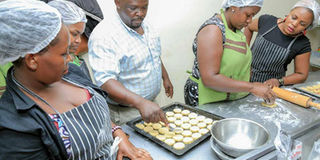Train the next crop of culinary talent

Mr John Oundo (centre) trains women in culinary skills at Kyaliwajjala, Wakiso District. Photo by Dorothy Nakaweesi
What you need to know:
- His institute mainly offers two modules in Pastry and À la carte (the practice of ordering individual dishes from a menu in a restaurant). Each module takes about three to four months. For pastry courses, he charges Shs1 million while those who want to take on à la carte courses pay Shs400,000.
- Experts warn that establishing this business as a joint venture with an existing business that is already successful can help you minimise startup investment, capitalise on an existing client base and share overhead costs.
There quite a number of income generating activities that you and I can do. Some just require your skills to get started without necessarily having capital.
You just need to be well-organised, know how to work under pressure and relish being part of a team to start training others in cookery skills.
If cookery is your passion, you can open a training kitchen that will help some people to pursue careers in the culinary world.
Let’s break down what you need to start training youth and adults who are interested in a professional cooking career.
Mr Newton Buteraba, the chief executive officer House of Wealth, a local firm offering business advisory services, says: “Teaching people how to cook is one of those businesses which don’t require a lot of capital to start. Yet it has the ability to turn you into a millionaire within one year.”
Start
Ordinarily, business development experts say assuming you already have a spacious home and kitchen; all you need is little money to advertise your skills training services by printing brochures and business cards.
“When you attend conferences and meetings, give out your business cards and request to make short presentations about your specialties,” Buteraba shares.
He, however says that the best way to get quick market is to go to schools and talk to candidate class students about your services.
Say, if you are able to visit 10 schools and get 1 per cent from each. Supposing they have 500 candidates, at the end of the day you will be assured of about 50 students to train.
If each student pays Shs150,000 for training and buys the materials they will be using, you will be able to collect Shs7.5 million.
Supposing each month has two course modules with the same number of students, you will be assured of collecting Shs15 million with this period.
With expenditure costing you Shs5 million, this means your profit will be Shs10 million monthly. Supposing you are operating all year round, your bank account will grow to Shs120 million.
“Remember you are doing this at the confines of your home with no rent. Other expenses will be catered for by the tuition collected from the students,” Mr Buteraba shared.
Advice
Buteraba says you don’t have to wait for a lot of money or borrow to start buying dish or Chafing dishes, plates and cutlery.
You can start using the dishes in your kitchen and if you don’t have enough, look out for those who can rent theirs.
When it comes to buying materials for the students to use, you will not look into your pockets but instead make this part of the fees you are charging/costing.
Mr Buteraba says after setting your base, make sure you register the business as a school and develop a curriculum to be followed.
Market and target schools with candidates going for long holidays and that is how you will never lack people to train.
Experts warn that establishing this business as a joint venture with an existing business that is already successful can help you minimise startup investment, capitalise on an existing client base and share overhead costs.
Experience
Sharing his success having started a culinary training school, Mr John Oundo, said with only one student in 2013, self-employment began.
With investment capital of about Shs1 million, five years later, he boasts of Shs20 million in annual profits and has been able to train many students who also refer others to his school called ‘Gifted Hands Pastry School Uganda.’
His institute mainly offers two modules in Pastry and À la carte (the practice of ordering individual dishes from a menu in a restaurant). Each module takes about three to four months. For pastry courses, he charges Shs1 million while those who want to take on à la carte courses pay Shs400,000.
“Passion is what has brought me this far. If I was so much into money, this school would not be here now,” Mr Oundo shared.




